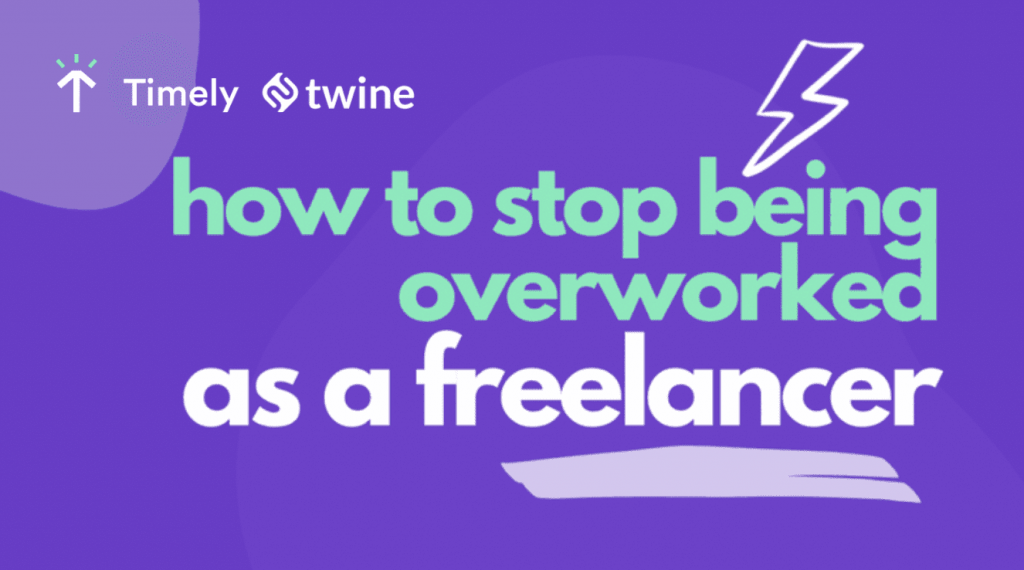
If you’re a freelancer, you’re probably already aware of how hard it can be to strike the right work-life balance. While most freelancers set out hoping to enjoy more free time and flexibility, many of them end up feeling overworked – meaning they’re at risk of burnout.
The feast or famine nature of this business means that most freelancers have experienced the fear of not having enough work, which can make it enormously hard to say “no” to jobs.
So, if you feel like you’re being pulled in too many directions, how can you make your workload more manageable? Here’s everything you need to know to stop being overworked as a freelancer.
How freelancers become overworked

Firstly, it’s important to understand why freelancers are such chronic over workers.
The first reason is pretty simple: their workloads are just unsustainable. When you’re working for yourself it’s not easy to say “no”. Freelancers don’t get holiday pay or sick pay, they don’t get money put towards a pension, and they don’t have the security of full-time employment.
What this means is that there’s constant low-level anxiety simmering away—a fear that the work might dwindle and disappear, and the freelancer will be left high and dry.
When you have this “freelancer fear”, you tend to take on as much work as you can—at least in the beginning—and try to make as much money as possible. But then once you’re working for these clients or projects, it’s hard to ask to wind down your workload. What if the client stops hiring you? What if all your other work dries out and you don’t have any new leads?
So, you keep slogging away, working long hours and into the weekend, even though ultimately, you just don’t have enough time to serve and satisfy all the work you’ve agreed to take on. Without sacrificing your own health, wellbeing, and lifestyle, you’re at risk of being overworked.
Client expectations
Another common reason freelancers overwork is because of unclear expectations with clients. Some clients expect immediate availability and all-hours communication, while others send vague briefs that result in continual scope creep or endless rounds of iterations. Then there are those clients who suddenly change direction in the middle of a project, rendering the work you’ve done useless and leaving you floundering to keep up and hit that deadline.
All of these acts scream of misaligned expectations between you and your client—either around the work you’re hired to do, the stages within your process, your role, how you bill, or how you should communicate. Sometimes, if you’re really unlucky, you end up with a client who has unrealistic expectations about all of these elements.
Self expectations
Unreasonable self-expectations are another cause of freelancers becoming overworked. People who choose the freelance lifestyle tend to be incredibly self-motivated, committed, and driven. They expect great things of themselves and are confident in the value of their skills.
But the danger of setting impossible standards for your own output can lead to pursuing perfectionism or becoming “over-engaged” in work.
Strategies for leading a healthier freelance lifestyle
So, now we know why so many freelancers have a tendency to become overworked, what steps can we take to enjoy a healthier freelancer lifestyle? The good news is that there are lots of ways we can protect our work-life balance.
1. Track all the work you put into each client
One of the easiest and most effective ways to stop being overworked is to track your time. Aside from the work itself, many freelancers grossly underestimate the amount of time they spend on things like communication and project management, not to mention the time they spend invoicing, marketing, pitching, and simply running their business.
But when you’re not aware of where your time’s really going you can’t begin to use it more wisely. Keeping everything you do visible is the best way to work out how to better manage your energy, client relationships, and daily work hours.
Time tracking used to have a reputation for being fiddly and time-consuming, but these days you can use automatic time trackers to do the heavy lifting for you – allowing you to focus on getting your work done.

2. Introduce working hours and routines
It’s also really important to establish boundaries for your working hours and routines. Not only can this be a good way to avoid being overworked, but it also helps you separate your work time from your personal time. Choose your working days and hours, and then make sure you stick to them. In-house employees don’t regularly work weekends or stay late in the office most days; neither should you.
You might want to think about introducing routines like a mock commute, which can bookend the start and end of the working day. For people who work in the office, riding the train or bus for 20 minutes can help them gently transition in and out of work mode, so consider going for a walk during the times you would have been traveling to and from work. When you hit the time you’re meant to clock off, make sure you do it!
3. Set communication boundaries
Setting communication boundaries around when you check your email and IM is another effective way to prevent burnout and feeling overworked. While there will always be occasions where we need to reply to an important email outside of work hours, you should still do your best to create healthy boundaries for how and when you communicate.
First, set your availability hours, and specify when you’ll be available by email or IM. Then, create inbox check-in times so you’re not compulsively checking throughout the day, which eats into your actual work time. Master your email notification settings, and don’t be afraid to hit “do not disturb”. Remember that you don’t have to reply to every email, and often a response isn’t necessary.
4. Establish clear policies and ways of working with clients
Many freelancers find it difficult to strike the right balance between pleasing clients and being taken advantage of. Before you agree to work with a new client or taking on a new project, it’s super important to make sure you manage client expectations. If it’s your client making you feel overworked, you have a real problem.
So, if you offer fixed rates, explain what that does and doesn’t include; layout how and when you will communicate; agree to deadlines and acceptable turnaround times for work; challenge the brief to make it watertight. If you’re unsure about something, be honest from the get-go. Remember it’s always better to underpromise and overdeliver than the other way around!
???? Should you bill for client communication?
5. Automate low-value admin
Freelancers are responsible for themselves, which means they don’t have anyone to offload those annoying-yet-necessary tasks to—things like invoicing and billing, tracking time, or managing email. But one of the perks of living in our digital age means we’re able to automate most of the unproductive tasks we don’t want to do.
So cut out as much draining work from your day as you possibly can. Use automatic tracking apps like Timely to get an accurate record of your work. Schedule your meetings intelligently using smart apps like Dewo. Look into building custom workflows for repetitive tasks.
6. Learn to say “no”
Learning to say “no” is one of the most effective ways to protect your time. For freelancers who worry about losing clients and work drying up, not being overworked becomes even more important. Working smarter means learning how to say “no”— to sloppy briefs, to favors for other people, to expanding projects, and to new business.
If you find this awkward, learn how to politely and confidently say it. Don’t fall into the trap of constantly worrying about where your next job is going to come from. Unless you have enough regular clients you know you can depend on, marketing should form part of every freelancer’s workload. When keeping a pipeline of prospective work is one of your priorities, you don’t need to worry about work drying up.
7. Structure your downtime
When you’re a freelancer, it’s easy for your work time to start bleeding into your downtime, no matter how hard you try to stick to your scheduled work hours. So protect your downtime by structuring it. If you have an exercise class or a friend to meet, schedule it for right after you’re meant to finish work. That means you’re forced to step away from your desk, even when you’re tempted to work late.
True productivity requires real downtime—and during real downtime, you’re not checking your emails or constantly thinking about work; you’re genuinely able to unplug and unwind. If you find it hard to unwind, consider trying things like meditation and yoga.
8. Check how you treat yourself
For freelancers, being self-aware enough to recognize your own dangerous behaviors is a powerful asset. Take some time each week to check how you’re treating yourself. For example, are you being overly self-critical? Are you giving yourself impractical workloads or unrealistic deadlines? Is it really possible to deliver what you had in mind within the time frame? Being overworked is one thing, but there may be a variety of other aspects you aren’t taking into account.
Plus, ensure to check whether you’re leaving enough time to invest in yourself. Do you have time to pursue interests away from work? Are you able to see friends and family? Do you have time for self-care and regular downtime? If you’re answering “no” to any of these questions, you know you’re not giving yourself enough time to actually live your life rather than just work.
9. Take regular deep breaks

Finally, if you want to be able to do deep work, be productive, and plow through your tasks as quickly and efficiently as you possibly can, you need to take breaks. But not just any old breaks—deep breaks. Concentration is a limited resource, and we can only focus for an hour or two (at most) before our brains start to stutter and slow.
Deep breaks let you take a cognitive breather and stay focused. Many of us take rushed, shallow breaks where we just turn from one screen to another or make ourselves a drink while skimming through messages on our phones. In contrast, deep breaks allow us to mentally disengage with work without introducing new distractions, questions, or stresses, so we’re able to dive back straight into our tasks when we return. Ultimately, whatever you decide to do, it must be unrelated to work.
????????
Key learnings
While a healthy flow of work is essential for long-term freelance success, it shouldn’t feel exhausting or overwhelming. It’s easy to normalize feeling overworked as a regular feature of freelance life, but it doesn’t have to be this way—and you simply won’t be able to sustain or enjoy freelance life if you do.
Keep these tips in mind to start taking ownership of how much you want to work:
- Work out the root cause(s) of your overworking so you can systematically address them—these are often linked to anxieties around freelancing, a lack of process or understanding with clients, and unhealthy self-expectations;
- Make sure you actually keep track of all the time you put into freelancing—a good time tracking app can do this automatically for you. Seeing how you spend time is essential for working out how to spend it better;
- Be more intentional with your time by setting clear boundaries around work—including for breaks and client communication;
- Be selective in the work you agree to do—don’t accept sloppy briefs or say “yes” to every proposal. Instead, prioritize the work that feels good, supports your values and objectives, and advances your career.
Ready to get hired? At Twine, we have dozens of top-quality jobs being posted each and every day. From design to marketing, development to copywriting – there’s a job ready for your skills. Join the marketplace of diverse creative talent here.



